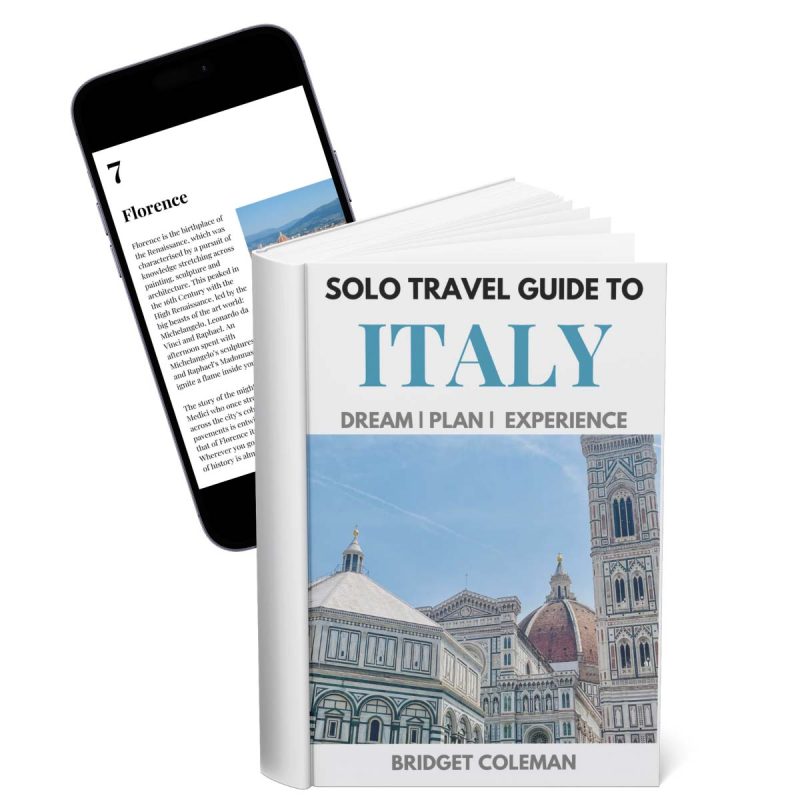I was lured to Vicenza by its celebrated architectural heritage and Palladian masterpieces but was seduced by its authenticity and lack of crowds. For my money, it’s one of the most rewarding destinations in Northern Italy and an easy day trip from Verona or Venice.
In this article, I spill the beans about how to spend a day in Vicenza, the best things to do and how to get there on a day trip by train.
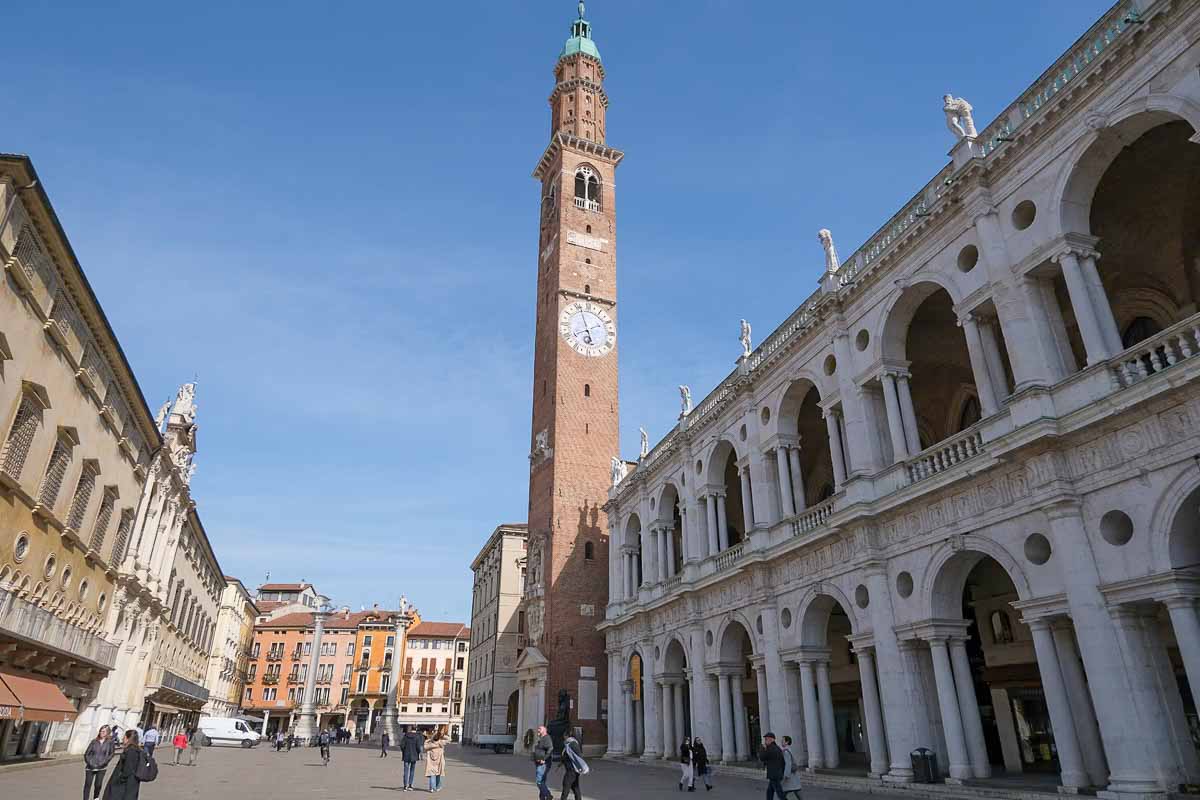
Some articles on this website contain affiliate links. This means that I may earn a small commission if you make a purchase through these links. As an Amazon Associate, I earn from qualifying purchases. Read the full disclosure here.
Introducing the City of Palladio
Vicenza is a pilgrimage shrine for many architects. It is the city of Andrea Palladio (1508 – 1580), the Renaissance architect who developed the style that spread throughout the world, from the White House in Washington DC to the palaces of St. Petersburg.
His distinctive architectural style, based on a detailed study of classical Roman architecture, is seen throughout Vicenza and gives the city its unique appearance. Vicenza is widely known as la città di Palladio, the city of Palladio.
UNESCO recognised Vicenza as the city of Palladio in 1994 and added its 23 Palladian monuments to the World Heritage List under this umbrella. These include palaces and public and religious buildings of the historic centre as well as 16 villas located in the province.
I’VE WRITTEN THIS ITALY SOLO TRAVEL GUIDE!
A 100+ page ebook to inspire and equip solo travellers with the confidence and knowledge to explore Italy independently
- Plan Your Trip – with curated itineraries, budgeting and how to get around
- Explore Awesome Destinations – guides to the must-see cities of Rome, Florence, Venice and Naples
- Stay Safe as a Solo Traveller – practical safety advice, empowering you to confidently navigate Italy and avoid common pitfalls
- Enjoy Eating Out in Italy – essential tried-and-tested solo dining tips
Best Things to Do in Vicenza in a Day (+ Map)
Palladio’s buildings may draw the crowds, but they are not the only show in town. The city also has an attractive historic centre, a wonderful park, lovely churches and elegant piazze to have an Aperol Spritz or two.
One day in Vicenza is enough to do a whistle-stop tour of the city and its Palladian sites, and sample the regional cuisine. If you have more time, you can delve deeper into Vicenza’s history and culture, visiting more Palladian villas, such as Villa Rotonda and Villa Valmarana ai Nani.
Here’s a map of the places I visited on my day trip. For a live, interactive map of Vicenza, click here or on the image.
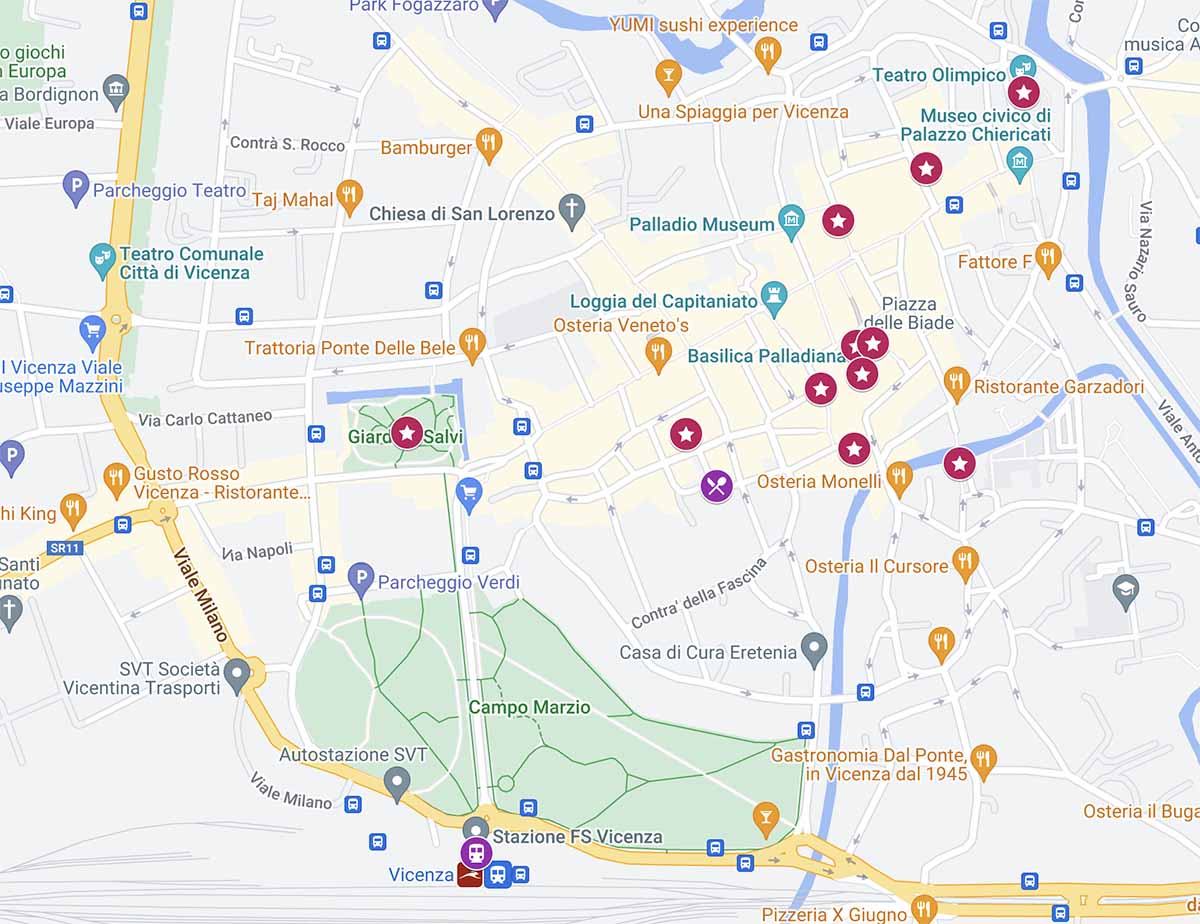
I recommend starting your day at the Olympic Theatre. This is the most distant of Vicenza’s central attractions and is next door to the helpful Tourist information, where you can buy a Vicenza Card, the city’s sightseeing pass.
The Olympic Theatre is a 15-minute walk from the train station. Head straight up Viale Roma and turn right down Corso Andrea Palladio.
Once you have visited the theatre, wind your way back through the other city attractions.
1. Gain some perspective at The Olympic Theatre (Teatro Olimpico)
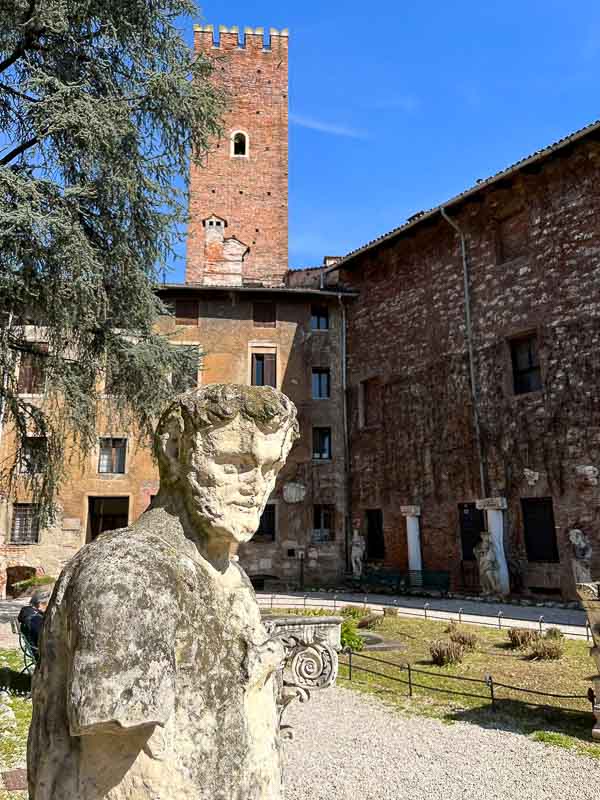
Built in 1580 and inspired by Roman theatres, Teatro Olimpico was Palladio’s swansong and should be at the top of your Vicenza sightseeing itinerary.
The architect was a member of the so-called Olympic Academy, a group of 25 literati and dilettantes who set out to build the elliptical theatre to host their plays and lectures. After Palladio’s death, Vincenzo Scamozzi added a stage set modelled on the ancient Greek city of Thebes.
It’s an astonishing feat of perspective, creating the illusion of streets radiating to a distant horizon.
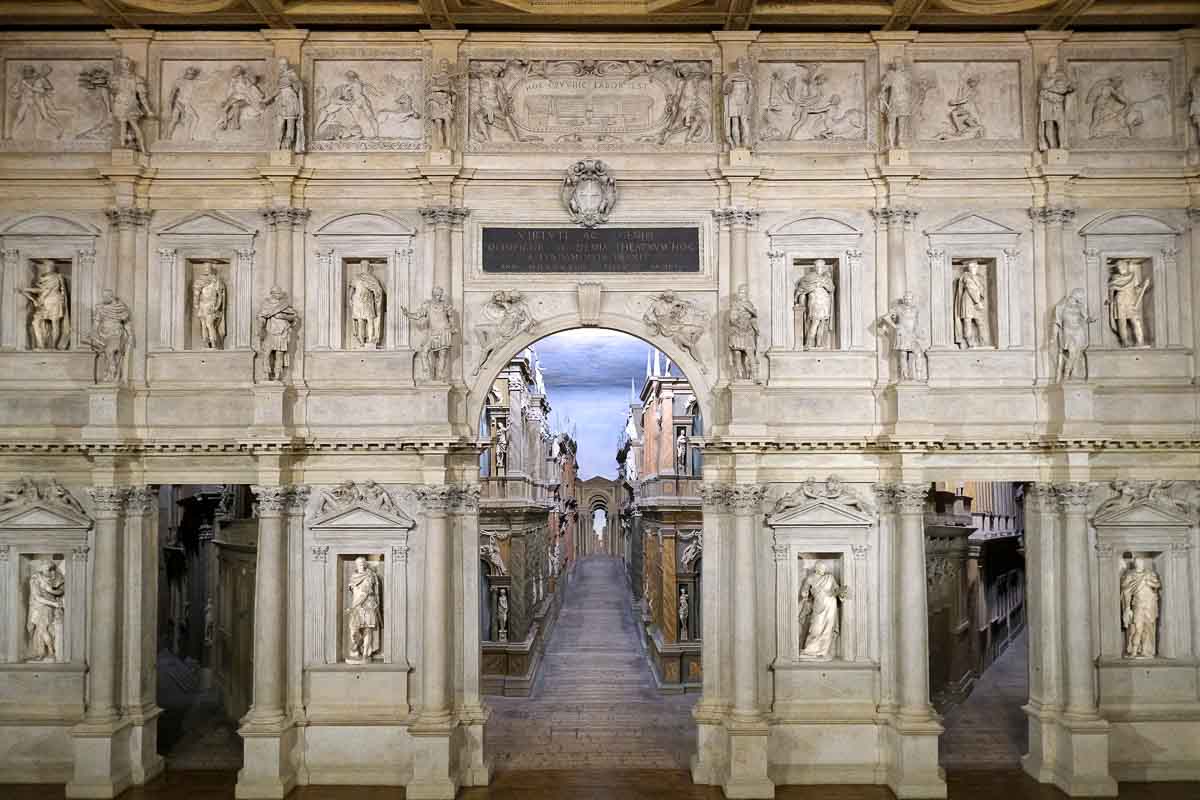
This masterpiece of the Renaissance world is the oldest indoor theatre in the world still in operation. Today, the Olympic Theatre hosts opera and classical concerts and is the setting for Vicenza Jazz.
There’s more information about the Olympic Theatre’s opening hours and ticket prices on its official website.
If you want to learn more about Vicenza and Palladio, consider this 2-hour private walking tour with a guide. It visits many of the places recommended in this guide and includes admission to the Olympic Theatre.
>>> CLICK HERE TO FIND OUT MORE
2. Chill out in Parco Querini
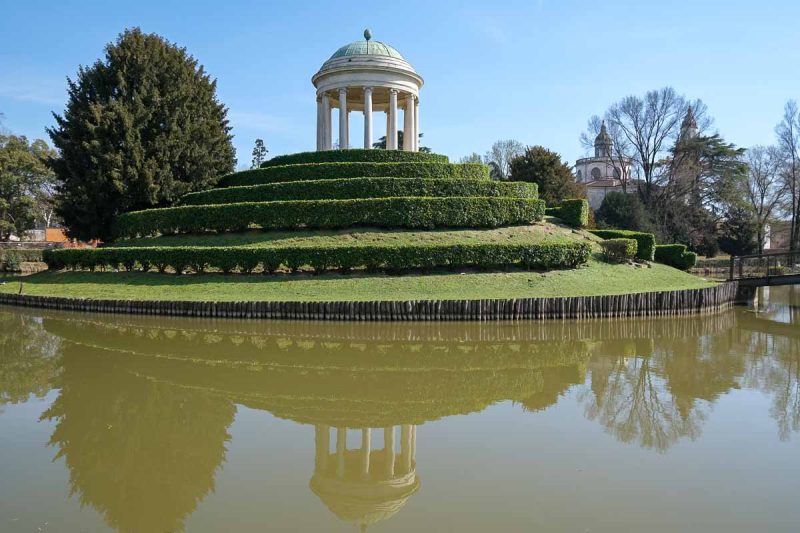
Parco Querini is Vicenza’s green lung.
This 24-acre park features meticulously manicured gardens and a Greek-style in the middle of a pond, guarded by a small army of turtles. There are also cocks-a-crowing and bunnies-a-hopping.
The majestic tree-line avenue leading southwest from the pond is lined with a series of fine Classical statues.
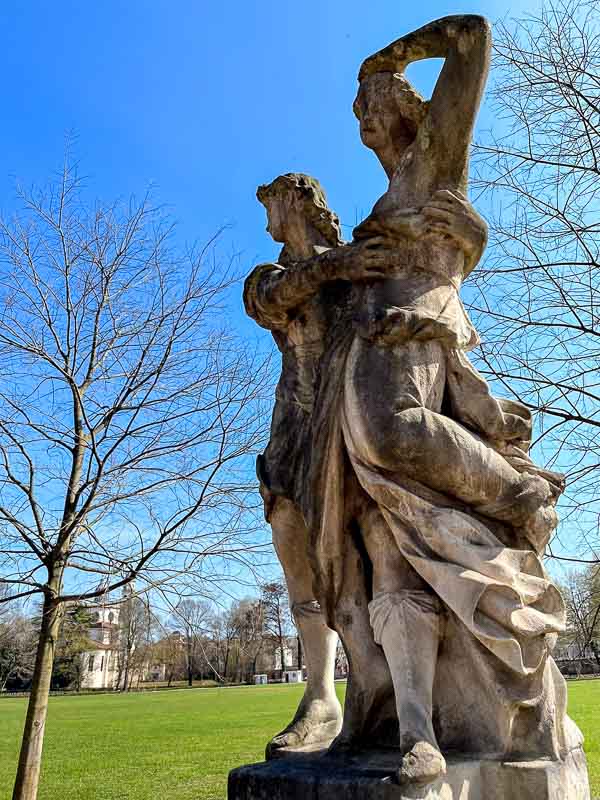
3. Admire the artistic masterpieces at the Church of Santa Corona (Chiesa di Santa Corona)
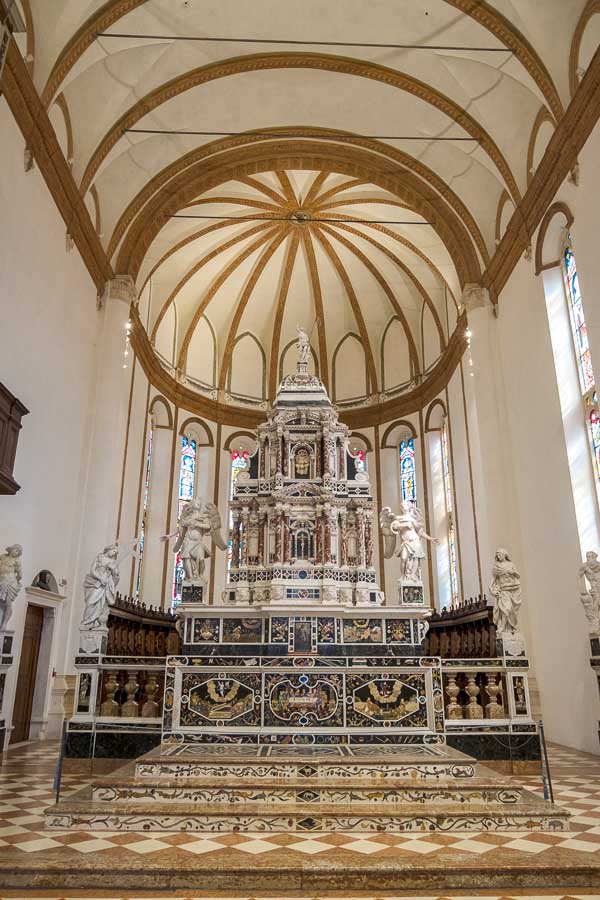
The Dominicans built the Church of Santa Corona in the 13th Century to house a relic from Christ’s crown of thorns, donated by King Louis IX of France. Don’t let its unassuming red-brick exterior fool you. Its light-filled Gothic interior houses three masterpieces.
The first of these is Palladio’s Valmarana Chapel in the crypt, built in 1576.
Paolo Veronese’s Adoration of the Magi hangs in the Sacra Spina chapel.
But for me, the artistic highlight was Bellini’s Baptism of Christ, witnessed by a bevvy of local beauties and a small red bird.
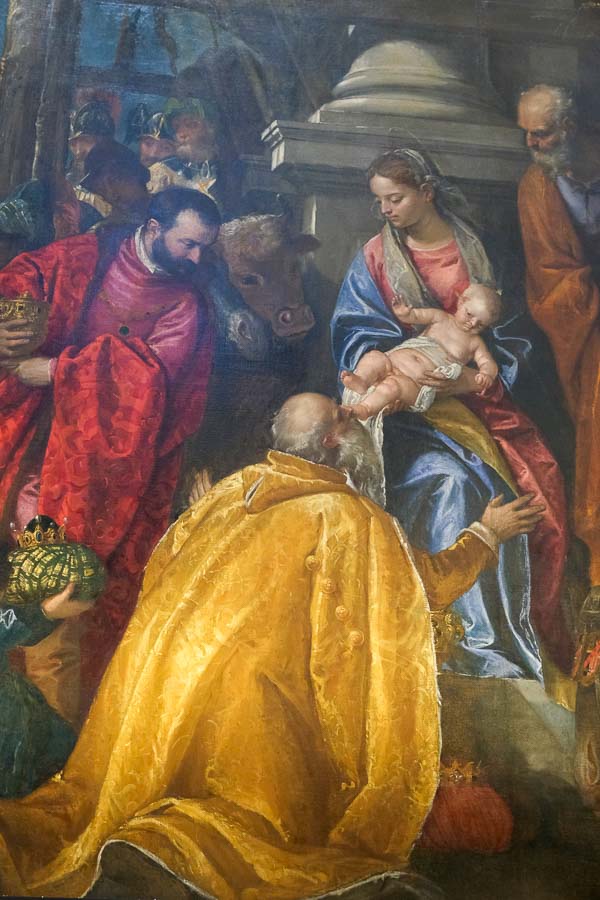
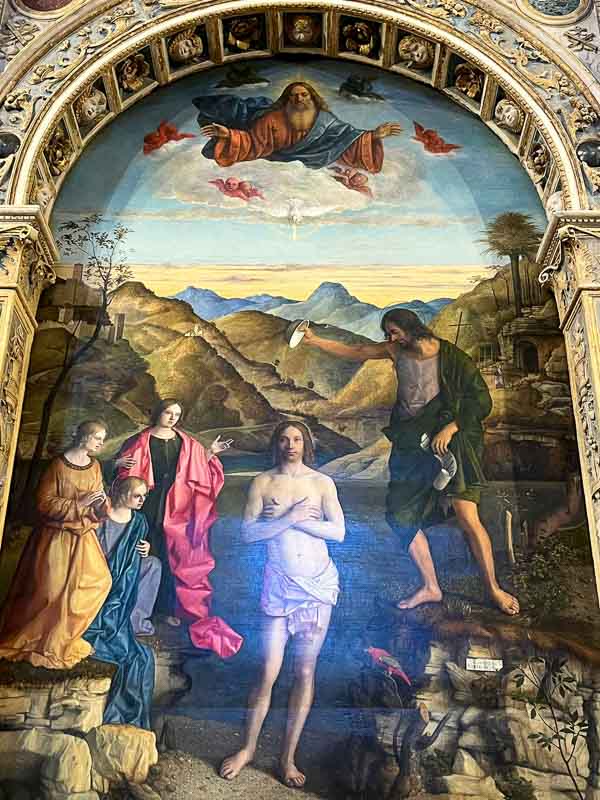
4. Explore Piazza dei Signori
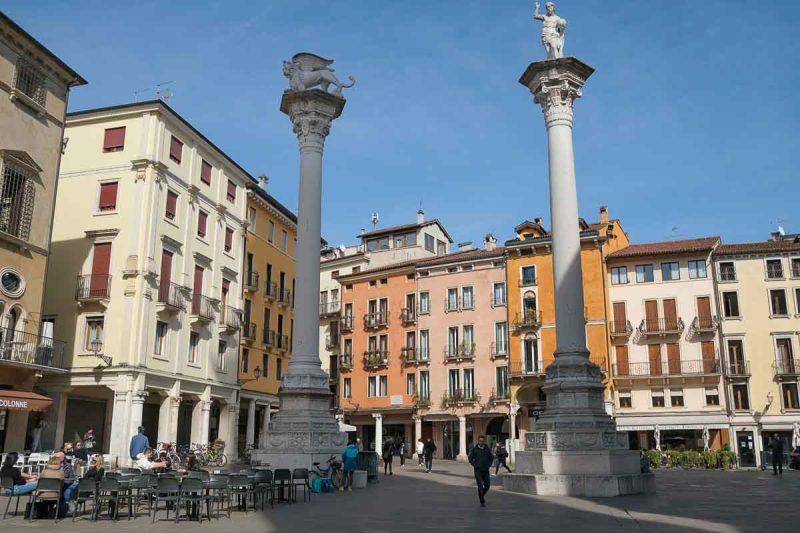
Piazza dei Signori has been Vicenza’s beating heart since its days as the Roman forum. It has two columns: St. Mark (1470) and the Redeemer (1640)
This majestic square is marked by the needle-like Torre Bissara and the Basilica. They share the piazza with Palladio’s Loggia del Capitanato, occupying its northwest end.
Built to celebrate Vicenza’s victory at Lepanto, Loggia del Capitanato has a red brick colonnade graced with white stone and stucco. It was meant to extend over two bays but was left unfinished when Palladio died.
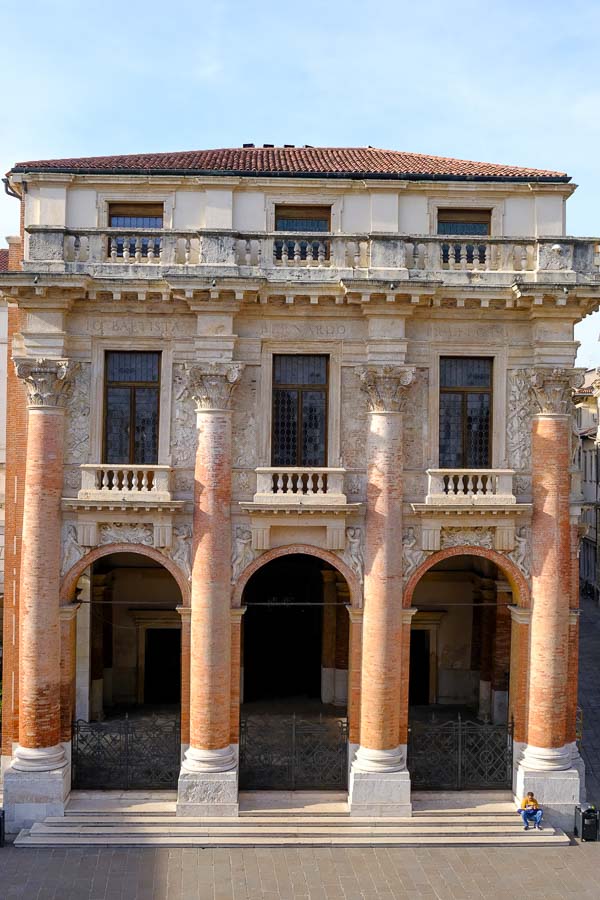
5. Sing along with the Torre Bissara
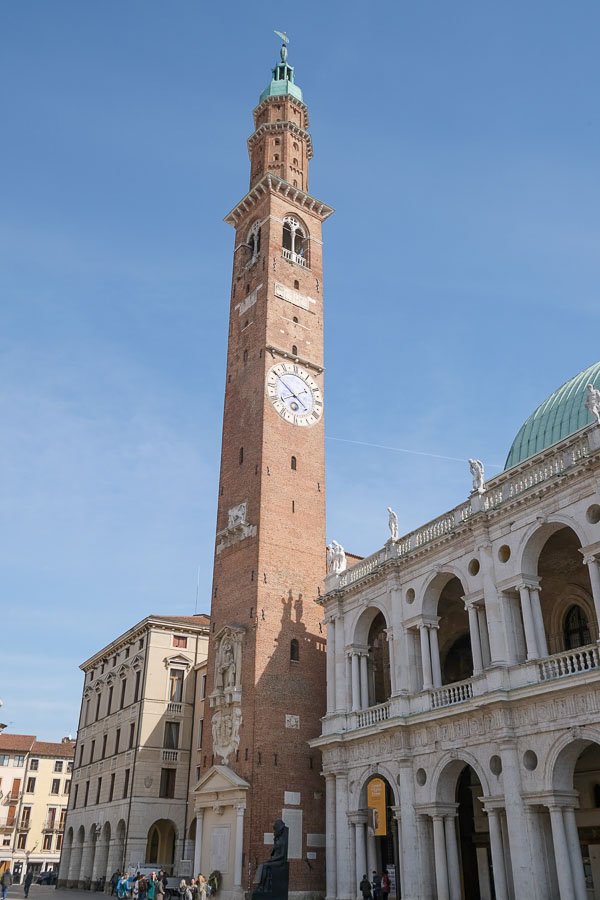
Torre Bissara rises above Piazza dei Signori like a giant exclamation mark. Also known as Torre di Piazza, it reaches a height of 269 feet, making it one of the tallest bell towers in Italy.
Dating from 1174, the tower takes its name from the Bissara family who built it. However, due to damage by an earthquake and World War II bombs, it has been rebuilt and restored over the centuries.
If you are near the tower at 11:53 a.m. or 5:53 p.m. you will hear it play a special melody composed by Maestro Valtinoni. Outside of these times, it chimes on the hour and half-hour.
6. Visit the Palladian Basilica (Basilica Palladiana)
In the 1540s, the Vicentines decided that the Piazza dei Signori’s crumbling Palazzo della Ragione was overdue a facelift and took a punt on a young unknown architect to do the job. His name was Andrea Palladio and Vicenza was never the same again.
He worked on the building – thereafter known as the Basilica – from 1549 until his death. Exemplifying the principles of Palladian architecture, its exterior features two tiers of white Piovene arches punctuated with Doric and Ionic columns.
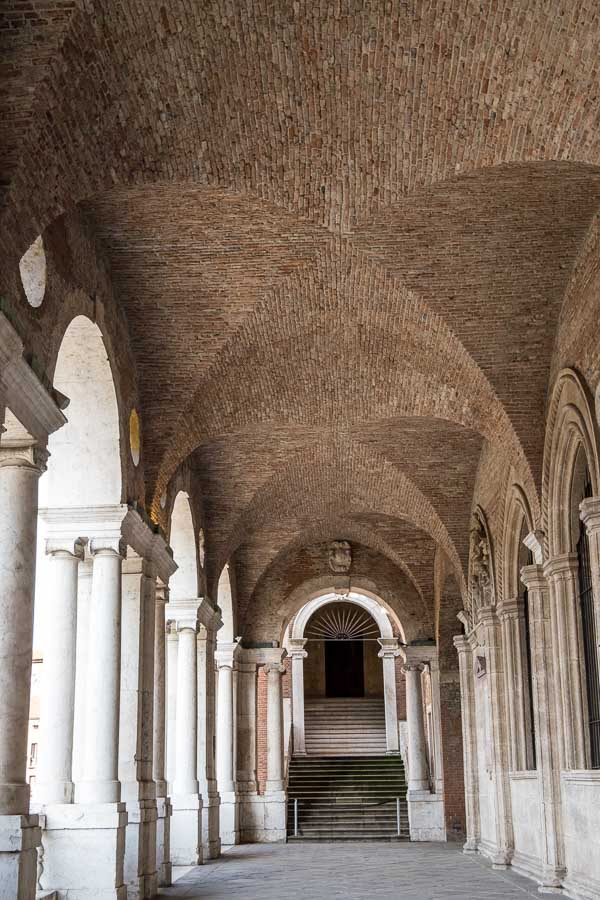
Formerly housing the law courts, Basilica Palladiana is now an exhibition space. However, the best thing to do here is to walk along its famous loggias, taking in the views of Piazza dei Signori and Piazza delle Erbe.
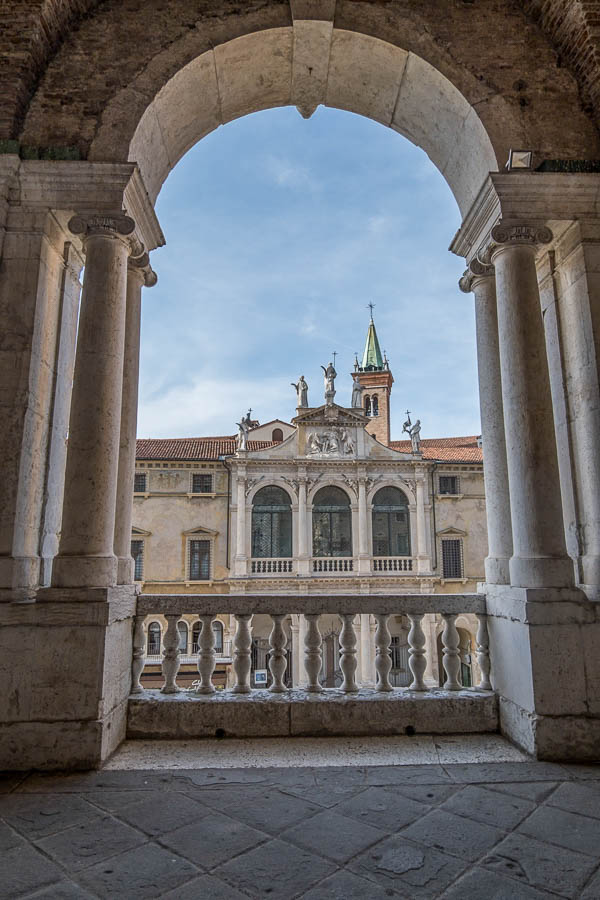
7. Say “buongiorno” to Palladio
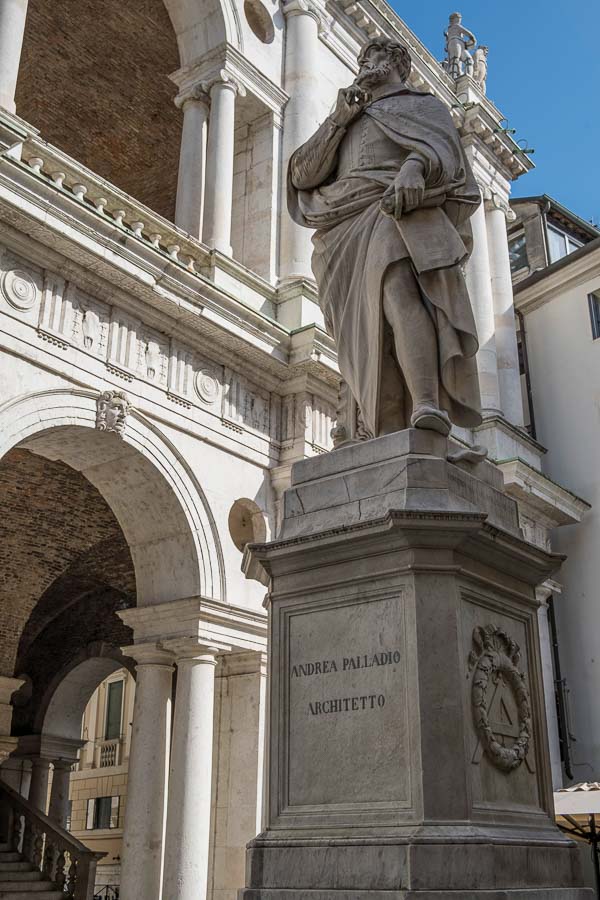
Do you want to pay homage to the great man himself? If so, stop at the white marble sculpture of Palladio next to Basilica Palladiana.
His likeness, created by 19th Century Roman sculptor, Vincenzo Gajassi, keeps a careful watch over his creations.
8. Discover Antonio Pigafetta’s birthplace
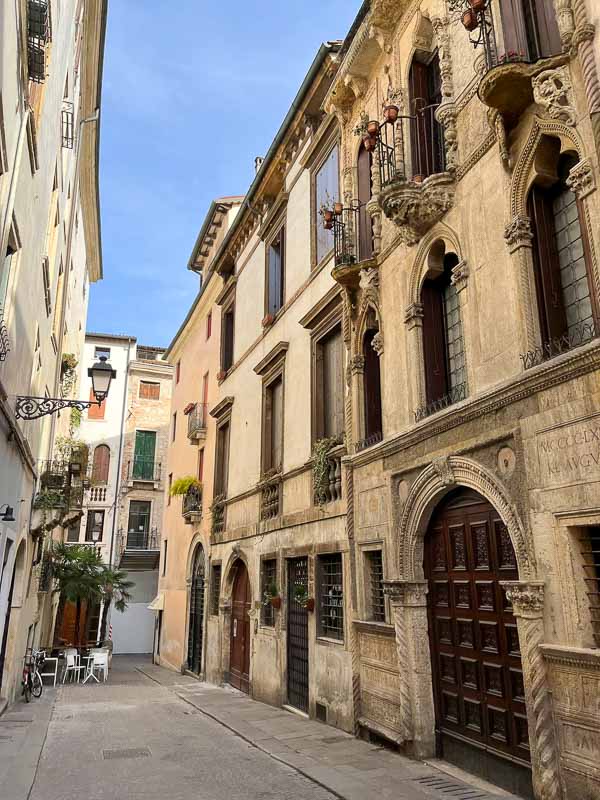
I stumbled across Casa Pigafetta by accident.
Built in 1440, this striking building was the birthplace of the Vicenza navigator, Antonio Pigafetta. He accompanied the navigator Ferdinand Magellan on the first circumnavigation of the world.
Casa Pigafetta is an extraordinary mix of architectural styles.
The building itself is Gothic with intricate carvings in Nanto or Vicenza stone. But there’s a wooden Renaissance door and graceful Arabesque-style windows.
As this building is a private home, it is not open to the public.
9. Stop by the Duomo of Vicenza
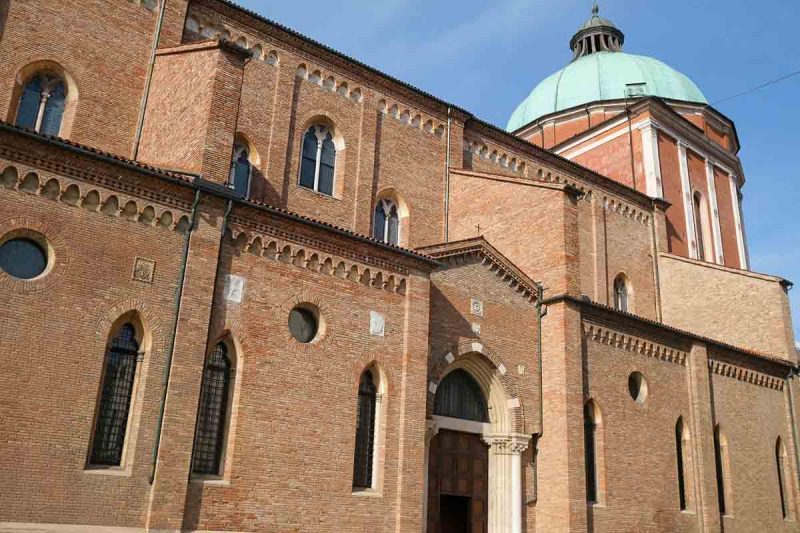
I don’t claim that the Duomo is a must-see in Vicenza, but it is worth popping in if you are passing.
Officially known as the Cathedral of Santa Maria Annunciata, it was started in the late 15th Century and showcases a blend of Renaissance and Gothic architectural styles. Andrea Palladio had a hand in designing the cathedral’s cupola, inspired by the dome of the Pantheon in Rome.
But thanks to WWII bombing raids, much of what you see today is a 20th-century reconstruction.
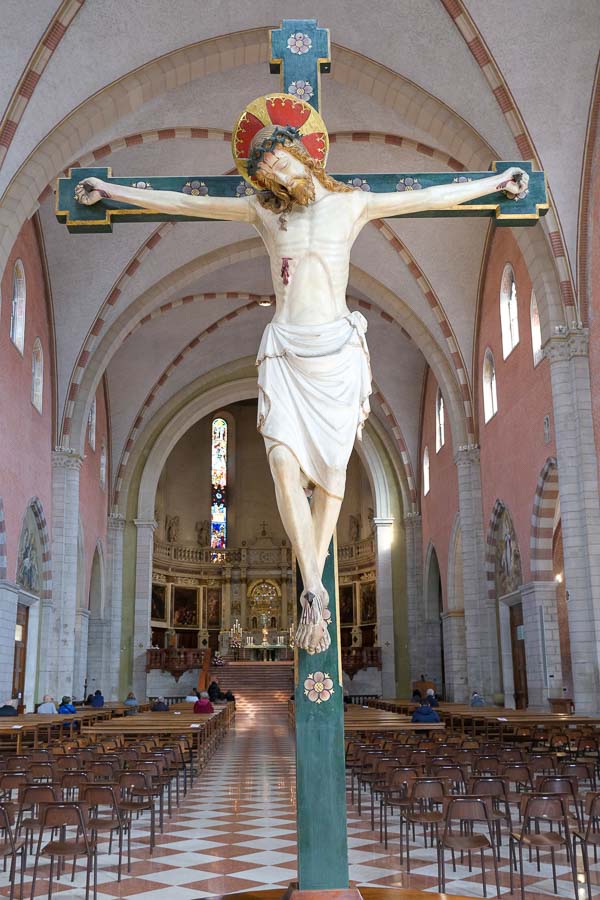
10. Try Bacala’ alla Vicentina at Righetti’s Restaurant
Let’s talk food.
Housed in a 17th-century palace at Piazza Duomo, Righetti’s Self Restaurant is a local landmark. As its name suggests, this is a self-service restaurant.
You choose a table, set it with a paper placemat and cutlery and then go to the counter to choose your courses (I recommend the Bacala’ alla Vicentina). Bread rolls and beer and wine on tap are self-serve.
The food was cheap, delicious and plentiful, and the staff were friendly and helpful. When it’s time to leave, tell the cashier what you had and settle up.
11. Take in the view of Ponte Michele
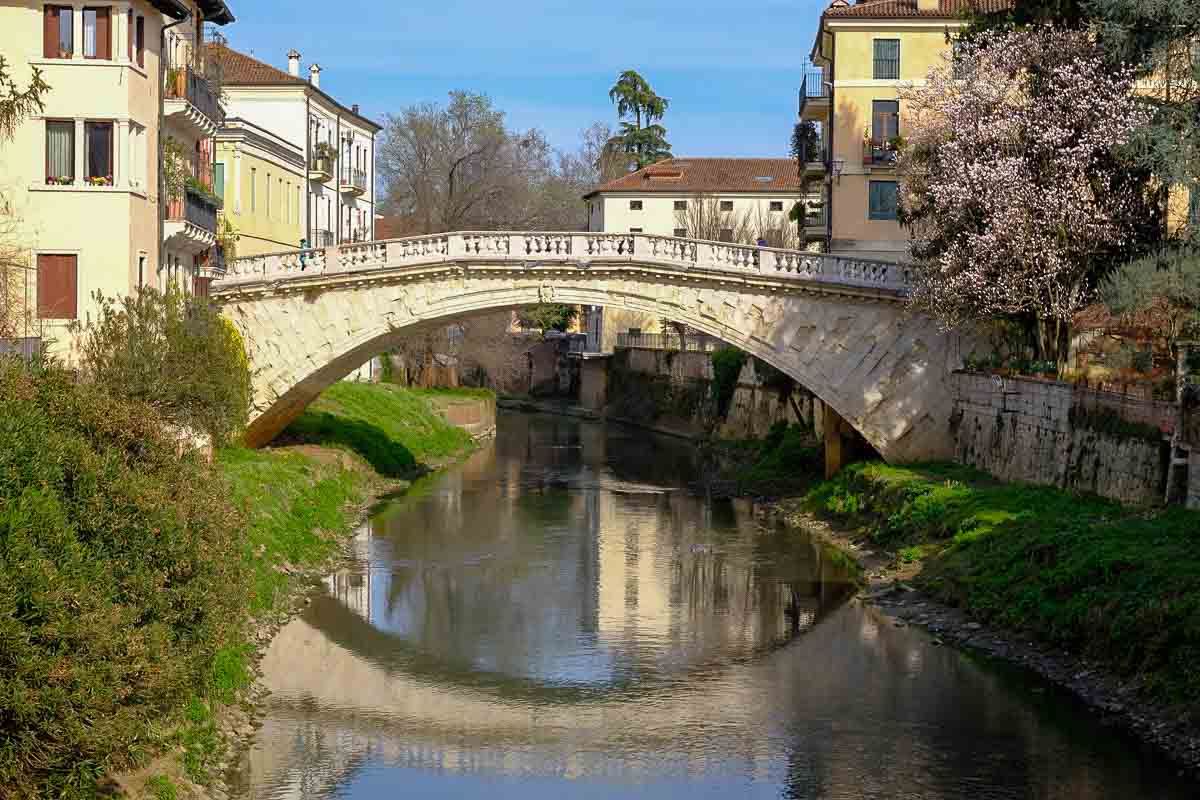
For some of the most beautiful views in Vicenza, head to one of its riverbanks. Its historic centre is bordered by two rivers: the Retrone and the Bacchiglione.
Ponte San Michele (Saint Michael Bridge) is a pedestrian-only bridge across the Retrone River.
The bridge we see today was modelled on Venetian bridges and built between 1621 and 1623 by the architects Tomaso and Francesco Contini. It replaced a stone bridge from 1422, which in turn replaced an earlier wooden bridge across this point in the river.
It takes its name from the nearby 13th Century Augustinian Church of San Michele, destroyed in the Napoleonic era.
12. Nurture your cultural soul at Palazzo Thiene
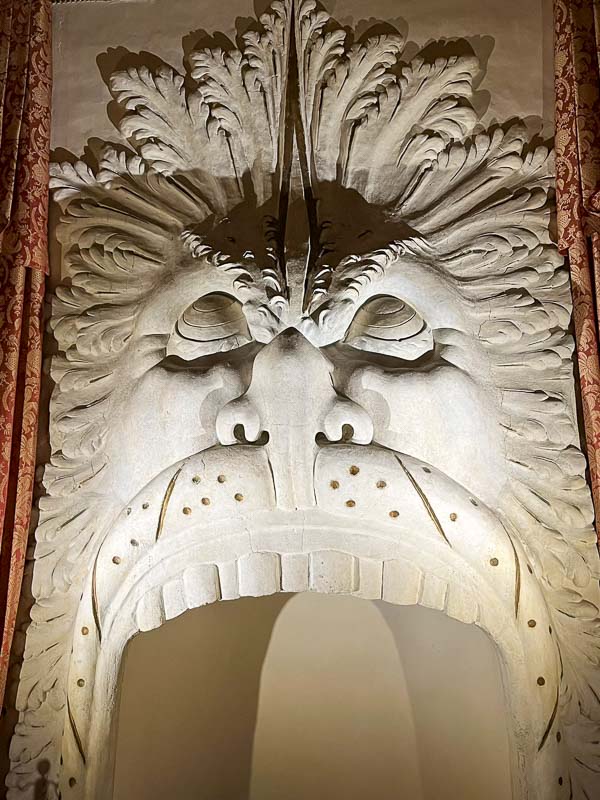
Like the basilica, Palazzo Thiene was a facelift project for Palladio. The aim was to make it the most imposing residence in Vicenza but, like a number of his projects, it was never completed.
Formerly the headquarters of Banca Popolare di Vicenza, it is now part of the city’s museum portfolio. I was less interested in its collection but more interested in the richly decorated interior, with its stucco work and frescos.
13. Stop by the Salvi Gardens (Giardini Salvi)
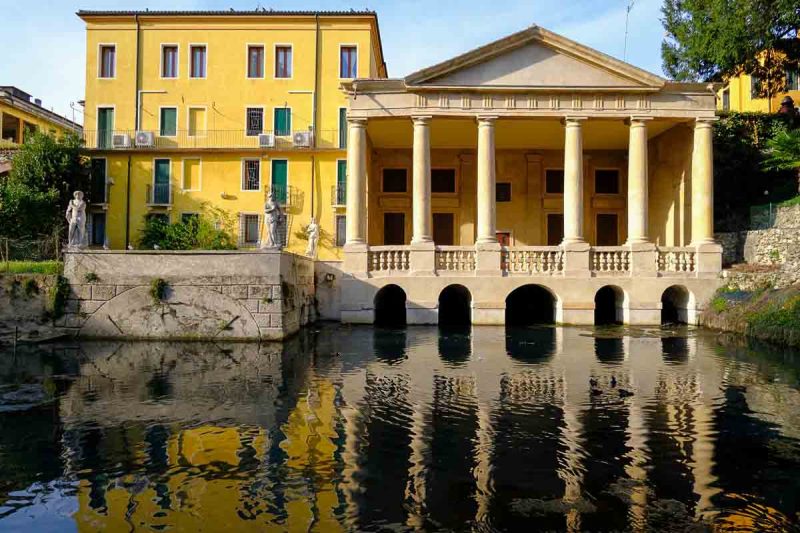
On your way back to the train station, stop at these small gardens at the start of Corso Palladio.
The Salvi Gardens are home to Loggia Valmarana, a Palladian-style loggia thought to have been built in 1591 by a student of Palladio.
14. Stroll around Vicenza’s historic centre
But simply mooching around Vicenza is fine too. Its historic centre is a captivating blend of classical design and charm, offering a glimpse into Italy’s rich cultural heritage.
Thanks to Palladio, this is a cityscape like no other. If you want something more structured, pick up a free self-guided tour of his buildings from Tourist Information.
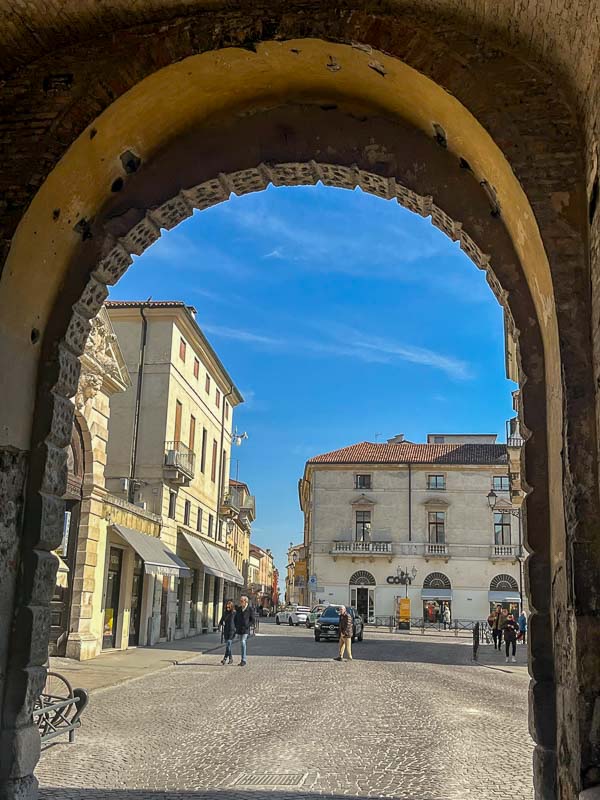
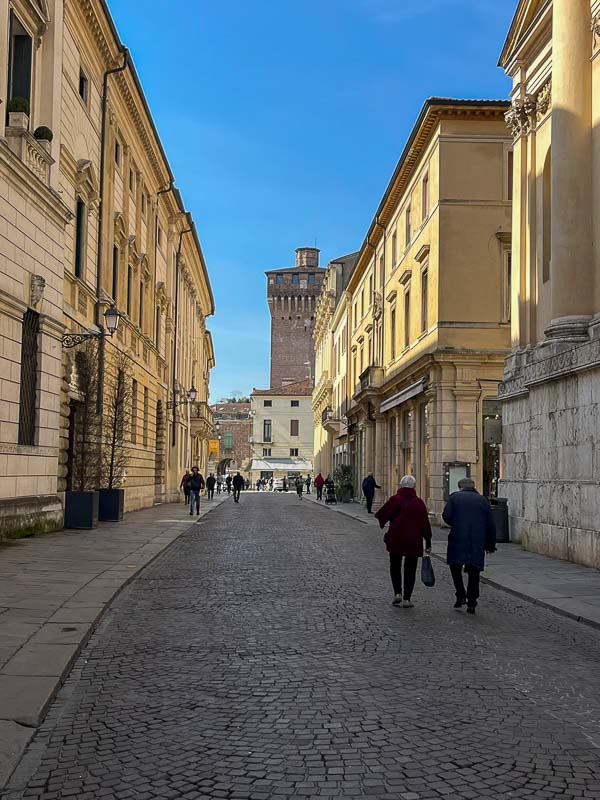
The Vicenza Card and 4 Museums Card
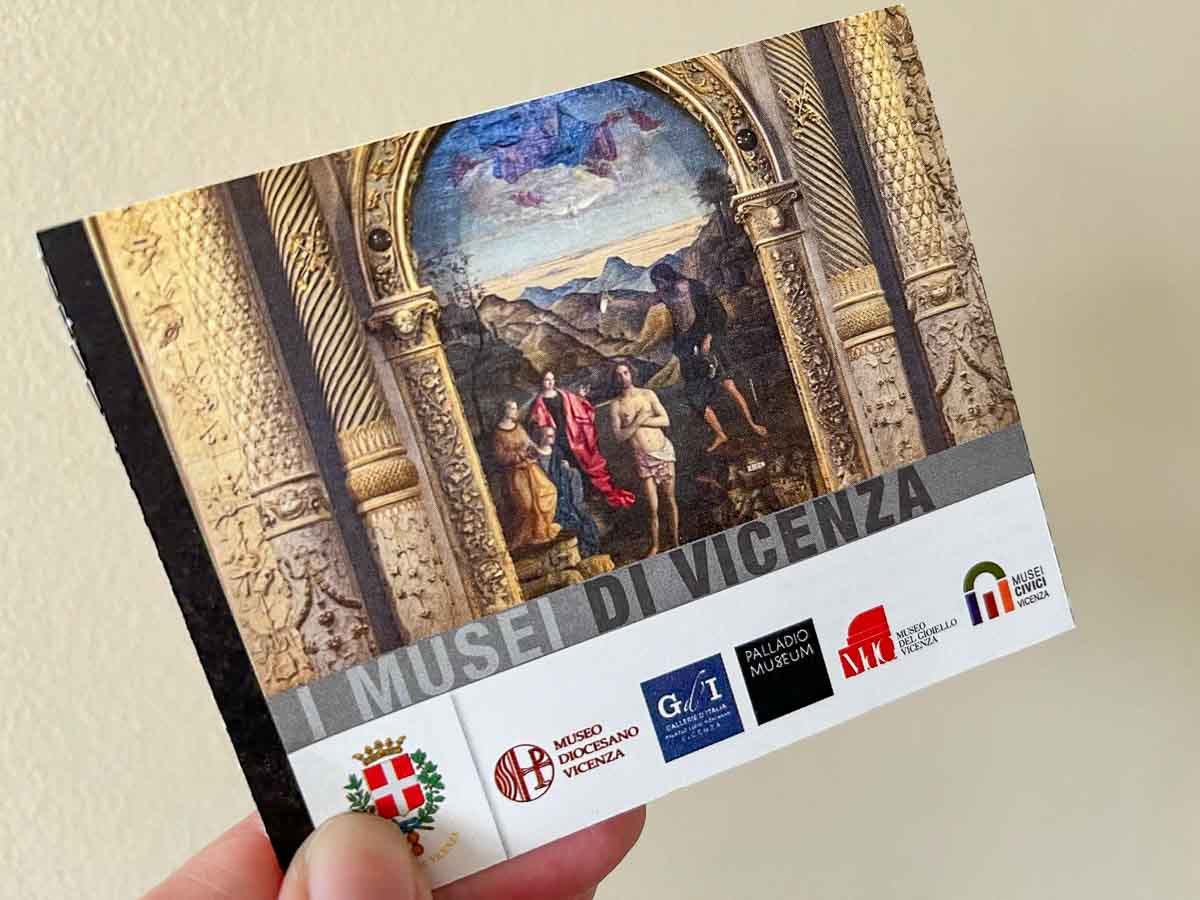
The Vicenza Card is valid for 8 days from the day of issue and gives you free entry to 11 sites in Vicenza:
- Teatro Olimpico
- Civic Art Gallery of Palazzo Chiericati,
- Palazzo Thiene
- Natural History and Archaeological Museum
- Risorgimento and Resistance Museum
- Santa Corona Church
- Diocesan Museum
- Palladio Museum
- Gallerie d’Italia – Palazzo Leoni Montanari
- Palladian Basilica (exhibitions excluded)
- Jewellery Museum.
If you are spending just one day in Vicenza, you may not get value from the Vicenza Card. I used a scaled-down version of this city pass, the 4 Museums Card, which gave me access to four of these sites.
In 2023, it cost €11 to visit the Olympic Theatre alone. The Vicenza Card cost €20 and the 4 Museums Card €15. In terms of cost and convenience, it was a no-brainer.
You can buy either of these passes at the Tourist Information in Piazza Matteotti, Gallerie d’Italia – Palazzo Leoni Montanari, Palladio Museum, Diocesan Museum, Jewellery Museum and Basilica Palladiana.
Getting There & Getting Around
Vicenza is in the Veneto, one of the Northern regions of Italy, roughly halfway between Padua and Verona and within easy striking distance of Venice.
The easiest way to get to Vicenza is by train. It’s on the line that also connects Venice, Padua and Verona and is an easy day trip from any of these cities.
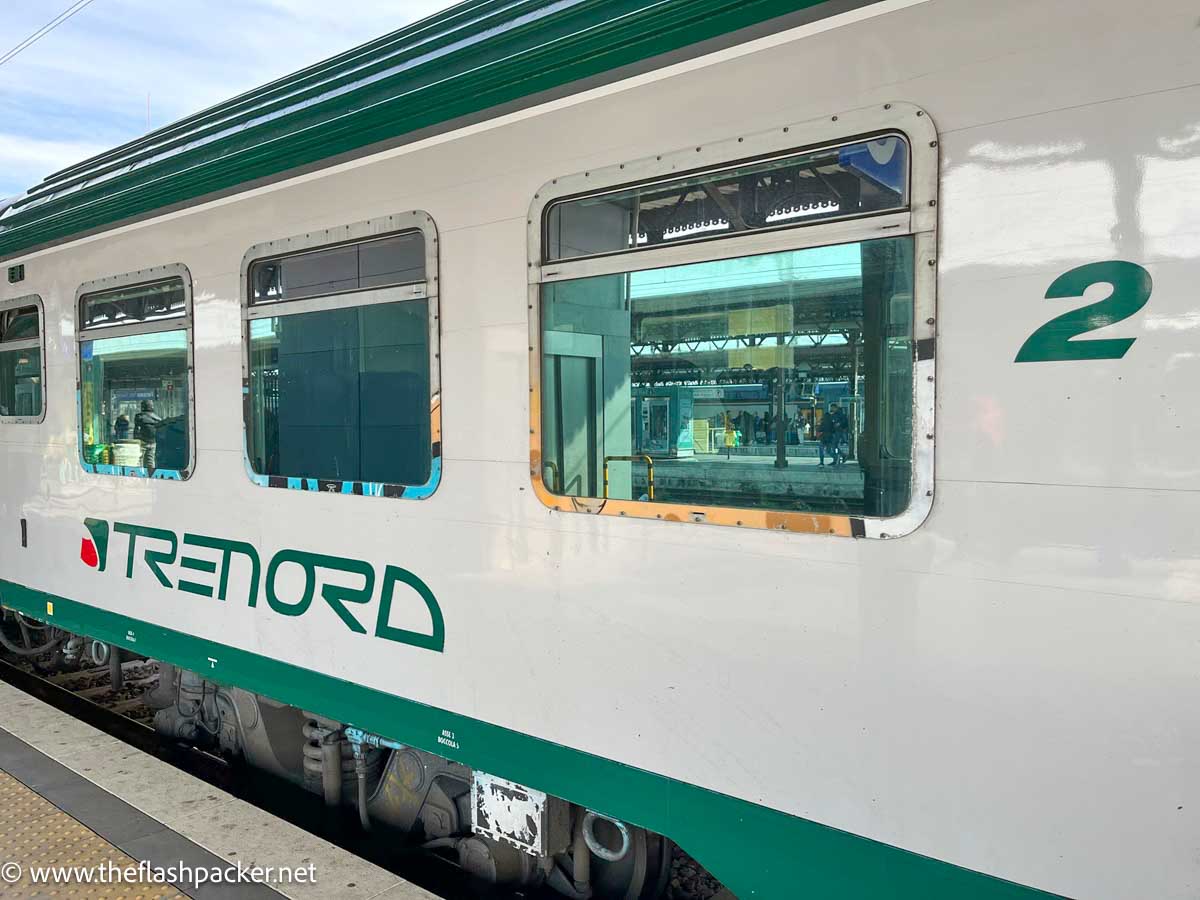
Services are provided by Trenitalia and Italo. Services are frequent.
Your best bet is to take one of Trenitalia’s fast regional (RV) trains. These are cheap and, as fares are fixed, you don’t need to book your ticket in advance. From Venice, one of these regional trains will get you to Vicenza in 46 minutes.
In comparison, Trenitalia’s more expensive high-speed Frecciarossa train makes the same journey in 44 minutes.
Italo trains from Venice will get you to Vicenza in as little as 33 minutes. Book in advance for the best fares.
You can search across both operators here.
Vicenza is a very walkable city and the best way to appreciate it is on foot.
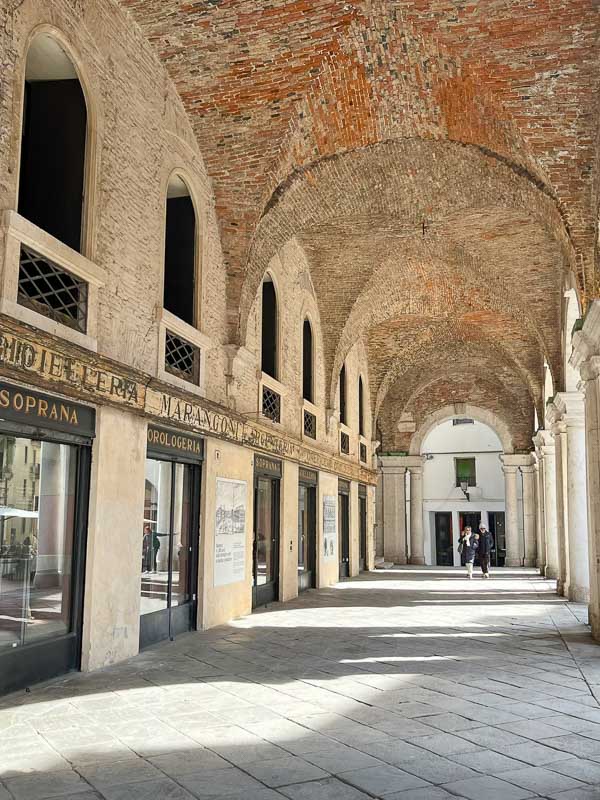
Where to next?
Have a fabulous time in Vicenza!
If you are looking for other places to visit in the Veneto region, take a look at some of my other articles:
- One Day in Verona, Italy: Fall in Love with the City of Romance
- Is Padua Worth Visiting? 10 Reasons to Say ‘Yes!’
- Visiting the Scrovegni Chapel in Padua: Giotto’s Masterpiece

About Bridget
Bridget Coleman has been a passionate traveller for more than 30 years. She has visited 70+ countries, most as a solo traveller.
Articles on this site reflect her first-hand experiences.
To get in touch, email her at hello@theflashpacker.net or follow her on social media.

